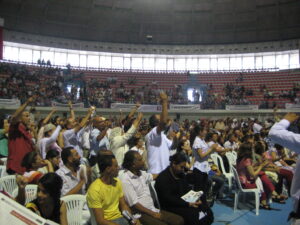
One is, however, inclined to wonder whether this displayed identitarian spirit might also turn into a problem to obtain wider consensus. While the overwhelming support for the revolution (which is not only democratic) in society is undeniable and thus the central demand for a constituent assembly rallies a clear majority, this will certainly not be true for the communism let alone for the PCOT’s particular brand. It is not by accident that some within the party proposed to change the name into Workers’ Party.
After a cultural program which not only stressed the communist heritage but also repeated the support for the Palestinian cause, came the central speech of Hamma Hammami, the leader of the PCOT, former political prisoner and widely recognized front figure against Ben Ali’s dictatorship. It touched central points of the current conflicts in Tunisia:
He insisted that the democratic revolution cannot be fulfilled if it does not become a social one, an anti-Zionist, an anti-imperialist one. Actually the movement did head in this direction as it was not by accident that the miners paved the way for the toppling of Ben Ali.
Hammami remembered, however, that the old elites still control the regime and that the old system so far has not changed much in terms of the societal structure. The poor continue to remain poor.
Actually we are faced with a counterrevolutionary regime which tries to stop the revolution by all means; Hammami said. For example the provisional government is reluctant to prepare the elections for the constituent assembly tacitly even trying to derail it. At this point Hammami called upon his people to register for the election and thus to help to transform the assembly into a revolutionary one.
Also at this point questions arise. While the inscription process is scheduled to be closed with the beginning of August, for the time being only a tiny percentage has registered. Certainly it is also possible to vote only by producing the identity card – as both PCOT and Ennahda demand. But the regime is likely to use this low inscription rate to delegimise the assembly. Some people think that the regime will even try to abort the elections. Under these condition the mere holding of the elections with strong popular participation is an act of continuation of the revolution. To achieve this, a co-operation with the Islamic forces seems necessary who also want the assembly to take shape.
Although Hammami in his speech defended Ennahda against the regime’s accusations to be behind some violent incidents, he nevertheless strongly lashed out against them on the question of the Islamic state and the Sharia laws. Given the fact that Ennahta has embraced a democratic state and thus the sovereignty of the people over legislation the attacks seems to echo the secularist sentiments – which apparently are also strong among the base of the PCOT. But these today play for the old regime who used to display itself as the saveguard for a secular state and continues to do so. Actually the main danger for the constituent assembly and the continuation of the revolution is exactly this secularist bloc which might even lead to abort the elections – remember the Algerian precedent.
Hammami closed with denouncing the NATO intervention in Libya and refusing any Imperialist intervention even under Arab disguise. He reiterated the support for the liberation of Palestine against Zionism.
Tunis, July 23, 2011